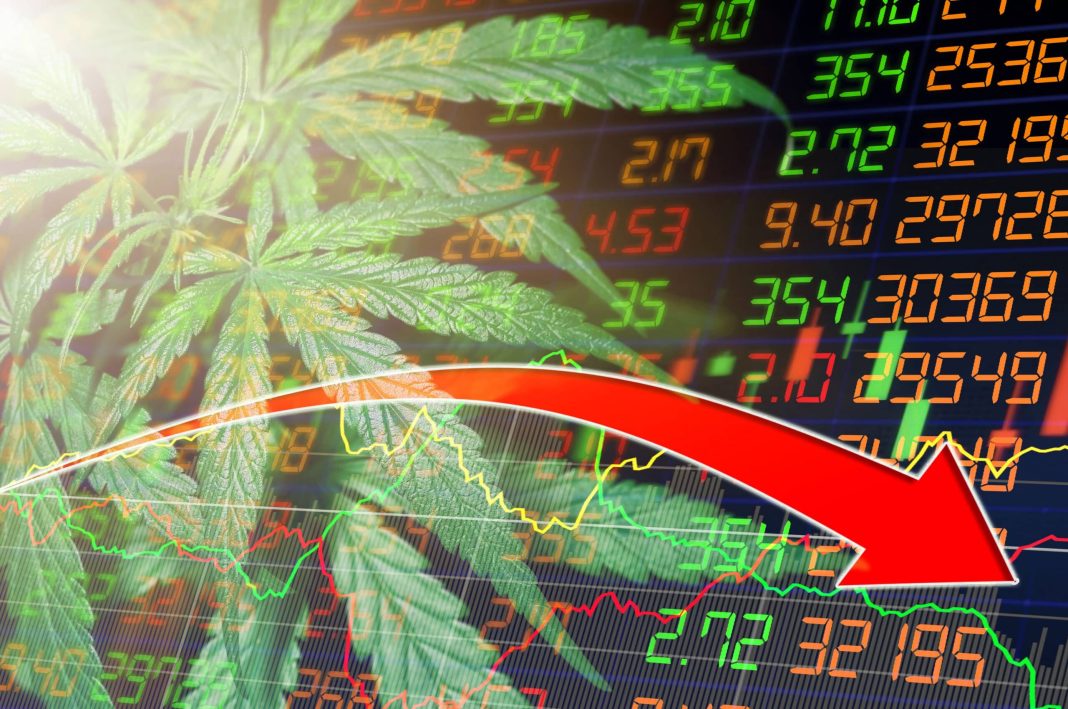Cannabis giant Canopy growth is up and down in the news, and its hard to know what the future will be. Recent news reports state that Canopy was booted off major stock index S&P/TSX; and this after news of a partial acquisition. What does this spell for the cannabis company moving forward? Read on for more info.
Companies rise and fall, and buy each other out, and make changes to structure, and so on. Sometimes these moves signal growth and expansion, and sometimes they look more like the flailing of a child, trying to stay afloat in a pool. The latter is the case with many large cannabis companies at the moment, including Canopy Growth. Canopy is a Canadian company based out of Swiss Falls, Ontario, which is publicly traded, including on Canada’s S&P/TSX.
It doesn’t hold the top spot at the moment in terms of global cannabis giants, but its in the top 10, and in 2019, it was #1 in stock value. The company began operations in 2015 as a result of a merger between Bedrocan Canada, and Tweed Marijuana. The years following the merger were the best for Canopy, (as well as other cannabis companies), and the company was able to greatly expand and had high stock prices. Canopy was the very first Canadian company to receive licensing officially, and begin trading in North America.
Canopy has operations through subsidiary Tweed, Inc., which is responsible for its dispensary line in markets like Manitoba, Saskatchewan, and Newfoundland and Labrador. In Manitoba and Ontario it operates under the brand name Tokyo Smoke. By 2016 it was considered the first unicorn of the weed industry; with the Financial Post reporting it had a $1 billion valuation at that time.
On the Toronto Stock Exchange it trades under the name WEED. In 2018 it was the first cannabis company to enter the New York Stock Exchange, where it trades under CGC. Another interesting designation is that it was the first cannabis company to make an official sale after legalization in Canada, a transaction that went down at a Tweed store in Newfoundland.
The company has global operations. Through a partnership with Alcaliber S.A. pharmaceutical in Spain; its ownership of Spectrum Therapeutics GmbH in Germany; its partnership with Spectrum Cannabis Denmark ApS; its acquisition of Annabis Medical in Czech Republic; and operations under the name Daddy Cann Lesotho, Africa. It also has a partnership with the UK’s Beckley Foundation; and other operations in Australia, Brazil, Peru, Chile, and Jamaica.
Start of decline?
In just a few years – by 2018 – the company’s market capitalization rose to $14 billion. However, that very year, chinks began to show. In an expansion attempt related to greenhouses in British Columbia and Quebec, the company ended up posting some pretty big losses; to the tune of $335.6 million for the last quarter of 2018. This angered board members, including Constellation Brands, which held the majority of board seats (four out of seven).
As tends to be the case in situations of unhappy board members, this led to some shaking up in the company ranks. CEO Bruce Linton was ousted. However, stock prices continued to fall anyway; and yet another new CEO – David Klein, was introduced in 2019. In 2020, Canopy announced that it would close several of its stores.
Then in late 2022, it made yet another announcement of decline. This time it announced in September that it would actually sell all its retail locations throughout the country; including Tweed and Tokyo Smoke operations. Canopy reached agreements with existent partner OEG Retail Cannabis, to take over all corporate stores outside Alberta.
OEG already operated franchises of Tokyo Smoke in Ontario; and this agreement handed over all intellectual property for Tokyo Smoke brands, to OEG. Canopy made a separate agreement to sell five retail locations in Alberta to the company 420 Investment Ltd. Last year, Canopy cut 245 jobs.

At the time of the retail location sales, CEO David Klein had this to say about Canopy and the future: “We are taking the next critical step in advancing Canopy as a leading premium brand-focused CPG cannabis company while furthering the Company’s strategy of investing in product innovation and distribution to drive revenue growth in the Canadian recreational market.”
Canopy Growth and S&P/TSX – the news
The company has had some ups and downs no doubt, and two recent ones indicate a further slip, and an attempt to come back; though not exactly in that order. In the most recent news, The S&P Dow Jones reported on June 2nd, via MJBizDaily, that it had updated its S&P/TSX listing, and that Canopy Growth was booted off it. The S&P/TSX Composite Index is a Canadian index which represents about 70% of the total market capitalization for the Toronto Stock Exchange, Canada’s biggest stock market. It’s the equivalent of the S&P 500 in the US.
Why did this happen? The index requires a certain level of market capitalization for inclusion. And Canopy no longer meets the requirements. This is reflected in its declining share price. To give an idea of just its more recent decline, in February 2021, S&P/TSX shares for Canopy were worth CAD $55 (USD $41). This meant a market capitalization of over CAD $25 billion, according to The Globe and Mail. Now? Shares trade at CAD $1.14, and the company is valuated at less than CAD $600 million. As a result, before the market opens on June 19th, Canopy will not be in it.
This news comes on the heels of another move meant to help the company grow. Just last month, on May 20th, MJBizDaily reported that Canopy was in the process of finalizing an agreement to take over a 19.99% stake in the company Indiva, a cannabis edibles manufacturer. This would give it control of sales and distribution for edibles brand Wana in the country, currently one of the top North American brands.
The deal is meant to stop a fight between Indiva and Canopy over the Wana brand; and gives Canopy exclusive manufacturing, distribution, and sales rights in Canada. Under the agreement between Canopy and Indiva, Canopy allows Indiva to exclusively manufacture and supply Wana products within Canada for the upcoming five years.
How does a company losing money everyday finance a deal like this? MJBizCon reports it will subscribe for 37.23 million shares of Indiva, to produce CAD $2.16 million; giving it a balance of CA$844,383. This will be accompanied by a cash payment of CA$1.25 million scheduled for May 30th of 2024.

Similar story to Aurora Cannabis
Getting thrown off a stock market exchange isn’t good. It’s a clear indication of low-performance, or at least, lowered performance. Companies fight to get big enough to get on the exchanges in the first place. The S&P/TSX, for example, requires a few things, for which Canopy no longer applies.
A company must already be listed on the Toronto Stock Exchange. It must have a certain liquidity amount above .125% of the trading volume of all eligible securities between the US and Canada, as a dual-listed stock. And it must have met a market capitalization of at least .04% of the index. Additionally, the share price cannot drop below $1 for a certain period of time. This exchange isn’t simply walked into, it must be earned by having good business. As of June 7th, Canopy trades at $.72 according to Yahoo Finance.
Another company recently made news by falling short of its requirements to stay on an exchange. Aurora Cannabis is another major Canadian brand, based out of Edmonton, Alberta. And too is having similar issues. The difference is as of yet, Aurora was only warned; and technically has time to lift itself up to remain on its exchange. In this case, the exchange is Nasdaq.
As per the company, it was notified on March 24th of this year that it’s share price had dropped below $1, between February 8th – March 23rd. The company has 180 days to bring the price back up to Nasdaq standards, according to standard policy.
This gives Aurora until September 20th, 2023. In order to retain its place, it must raise its stock price back to the Minimum Bid Price Requirement; which means closing for 10 consecutive days above $1. Aurora is also traded on the Toronto Stock Exchange, for which its placement there is unaffected by anything related to Nasdaq. As of June 7th, its trading at about $.53, per Yahoo Finance. At its peak in 2019, it was trading at $119.52 a share.
Conclusion
Are we looking at the end of a very quick rise and fall? Is there an ability for companies like Aurora and Canopy to get their stuff together? If it is possible, what will it require in terms of company structuring and government regulation? It’s a big question right now in both America and Canada, as many companies are having problems even paying taxes, let alone making money. Perhaps this all points to the horrible running of the industry by regulatory bodies, which somehow seek to tank it out, rather than boost it up. For now, Canopy is off the S&P/TSX, and what that means long term, is hard to say.
Hello and welcome! We’re happy you’re with us at Cannadelics.com; a news source with an eye on independent reporting for cannabis, hallucinogens and beyond. We’ll keep you informed, just join us regularly; and subscribe to our Cannadelics Weekly Newsletter, for updates straight to you email.





